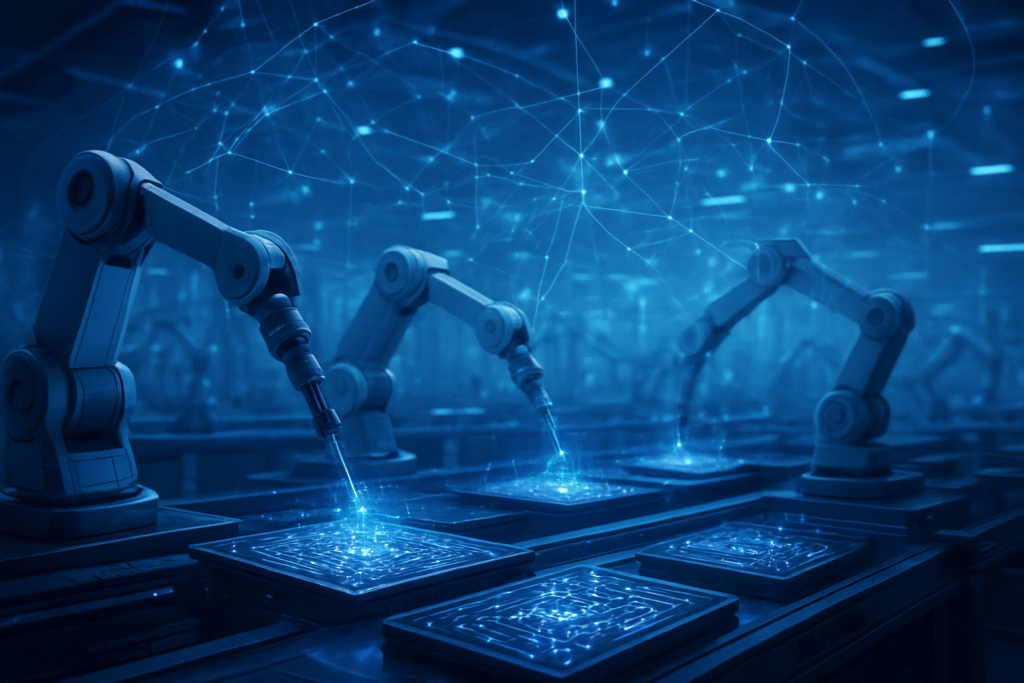
India's electronics manufacturing industry is undergoing a monumental transformation, rapidly emerging as a pivotal global production hub. At the forefront of this surge is the remarkable growth of 'made-in-India iPhones,' which have not only catalyzed a domestic industrial boom but also propelled the nation into a major global exporter. This dramatic shift, underpinned by strategic government policies, massive corporate investments, and an increasing embrace of advanced manufacturing technologies, including artificial intelligence and automation, signifies India's growing prowess in high-tech production.
The story of India's electronics ascent is one of ambition meeting execution. Domestic electronics production has soared more than fourfold, from US$29 billion in FY15 to an estimated US$133 billion by 2024-25, with projections to hit US$300 billion by FY26. This exponential growth has seen the number of manufacturing units skyrocket from a mere two to over 300, creating 2.5 million jobs and solidifying India's position as the world's second-largest smartphone manufacturer. The value addition within the sector has also dramatically increased, signaling a deepening of the domestic supply chain.
The Technological Backbone of India's Manufacturing Might
The 'made-in-India iPhone' phenomenon is a testament to the nation's burgeoning manufacturing capabilities. In the first half of 2025 alone, iPhone production in India surged by an impressive 53% year-over-year, reaching 23.9 million units. This unprecedented ramp-up has profound implications for global supply chains, with over a fifth of global iPhone sales now shipped from India, a share projected to reach 25% by 2027. For the first time, all new iPhone 17 models are being produced in India for global markets from their launch, demonstrating a significant shift in Apple's (NASDAQ: AAPL) manufacturing strategy.
This rapid scaling and quality assurance are increasingly being powered by sophisticated technological advancements. The Indian electronics sector is actively integrating industrial automation, the Industrial Internet of Things (IIoT), and AI-powered solutions. Companies like Omron Industrial Automation have showcased AI-powered defect detection systems that drastically improve productivity and accuracy on the factory floor. Robotics, often integrated with AI for enhanced precision and efficiency, is also gaining traction, with firms like Grey Matter Robotics specializing in AI-powered robotic systems for manufacturing and Veco Robotics utilizing 3D sensing and computer vision for delicate electronics assembly. Furthermore, the exploration of Generative AI for automating innovative designs and optimizing complex systems, and Agentic AI for dynamically reconfiguring logistics to address supply chain disruptions, highlights a forward-looking approach to manufacturing excellence.
The strategic policy framework, including the Production Linked Incentive (PLI) scheme, the Electronics Component Manufacturing Scheme (ECMS), and the India Semiconductor Mission (ISM), has been instrumental in attracting significant investments. Giants like Tata Group (NSE: TATAELXSI), through Tata Electronics, have acquired key manufacturing operations and are investing massively in semiconductor fabrication, a critical component for AI hardware. Foxconn (TWSE: 2317), Apple's largest manufacturing partner, continues to expand its footprint with multi-billion-dollar investments, further solidifying India's position as a high-volume, high-tech manufacturing hub.
Reshaping the AI and Tech Landscape
The growth of India's electronics manufacturing, particularly with 'made-in-India iPhones,' has far-reaching implications for AI companies, tech giants, and startups alike. For global tech giants like Apple, this development offers critical supply chain diversification, reducing geopolitical risks and fostering resilience. It also opens up a massive new market for AI-powered manufacturing solutions, as these companies seek to optimize their Indian operations for efficiency and quality.
The competitive landscape is also being reshaped. Indian conglomerates like Tata Group are not just becoming contract manufacturers but are evolving into sophisticated industrial players that will increasingly adopt and potentially develop their own advanced AI solutions for their extensive manufacturing operations. This creates a powerful synergy between hardware production and AI innovation within India. Meanwhile, dedicated AI startups focusing on industrial automation, computer vision for quality control, predictive maintenance, and sophisticated supply chain optimization stand to benefit immensely from the burgeoning demand within this sector. The need for smart factories, efficient logistics, and high-precision assembly lines presents a fertile ground for AI innovation, allowing these startups to scale their solutions in a rapidly expanding market.
This industrial transformation also positions India as a potential hub for manufacturing-focused AI research and development. As local companies and multinational firms invest in advanced production capabilities, the demand for local AI talent and specialized AI solutions will inevitably grow, fostering an ecosystem where AI development is directly tied to tangible industrial output.
A New Chapter in the Global AI Narrative
India's electronics manufacturing surge, driven by iPhone production and infused with AI and automation, represents a significant chapter in the broader AI landscape. It underscores a global trend where AI is moving beyond abstract software applications to become an indispensable component of physical production and industrial efficiency. This convergence highlights AI's role in enabling precision manufacturing, predictive maintenance, and intelligent supply chain management, transforming traditional factory floors into smart, interconnected ecosystems.
The impacts are profound, extending beyond economic growth to reshape global supply chains, making them more resilient and less concentrated. For India, it signifies not just economic prosperity but also a strategic move towards technological self-reliance and global leadership in high-value manufacturing. However, this advancement also brings potential concerns, notably the impact on employment due to automation. While new, higher-skilled jobs will emerge in managing and developing AI systems, there is a clear need for extensive workforce upskilling and reskilling initiatives to ensure an inclusive transition. This mirrors previous industrial revolutions, but with AI as the accelerating force, the pace of change demands proactive adaptation.
This milestone is comparable to previous industrial breakthroughs, but with a distinct AI signature. It demonstrates how AI can empower developing economies to leapfrog traditional industrialization stages, integrating cutting-edge technology from the outset to build globally competitive manufacturing capabilities.
The Horizon: Fully Intelligent Factories and Beyond
Looking ahead, the trajectory of India's electronics manufacturing points towards an even deeper integration of AI. Near-term developments will likely see AI permeating every stage of the manufacturing process, from generative design and material selection to predictive quality control and fully automated assembly lines. The ongoing expansion of India's semiconductor manufacturing capabilities under initiatives like the India Semiconductor Mission is crucial, as advanced chips are the bedrock for powering sophisticated AI applications in factories.
On the horizon, potential applications include the realization of "lights-out" factories, where AI and robotics handle entire production cycles with minimal human intervention. AI could also enable hyper-personalized mass production, where consumer demands are met with highly customized products manufactured efficiently at scale. Challenges remain, particularly in developing a robust talent pipeline for AI and advanced manufacturing, ensuring adequate infrastructure, and fostering cutting-edge R&D that can push the boundaries of AI in industrial contexts. Experts predict that India will not merely be a manufacturing base but will evolve into a significant R&D hub for manufacturing AI, driving innovation from within. The establishment of global R&D centers, like Delta Electronics India's facility in Bengaluru focusing on IoT and AI software, is an early indicator of this trend.
A Blueprint for AI-Powered Industrial Leadership
In summary, India's electronics manufacturing boom, spearheaded by 'made-in-India iPhones,' is a powerful testament to the nation's industrial ambition and its strategic embrace of advanced technologies. The integration of AI and automation is not just an ancillary benefit but a core enabler of this growth, driving efficiency, quality, and scalability that is critical for global competitiveness. This development marks a significant moment in AI history, showcasing its tangible impact on transforming traditional industries and elevating national economic capabilities.
The long-term impact of this trajectory positions India as a formidable global player in high-tech manufacturing, challenging established supply chain paradigms and fostering a vibrant ecosystem for AI innovation. It underscores how AI can be a catalyst for economic development, job creation (albeit with a shift in skill sets), and technological leadership. In the coming weeks and months, it will be crucial to watch for further policy refinements, continued multinational investments, the emergence of indigenous AI-powered manufacturing solutions, and the evolution of the Indian workforce to meet the demands of an increasingly intelligent industrial landscape.
This content is intended for informational purposes only and represents analysis of current AI developments.
TokenRing AI delivers enterprise-grade solutions for multi-agent AI workflow orchestration, AI-powered development tools, and seamless remote collaboration platforms.
For more information, visit https://www.tokenring.ai/.





